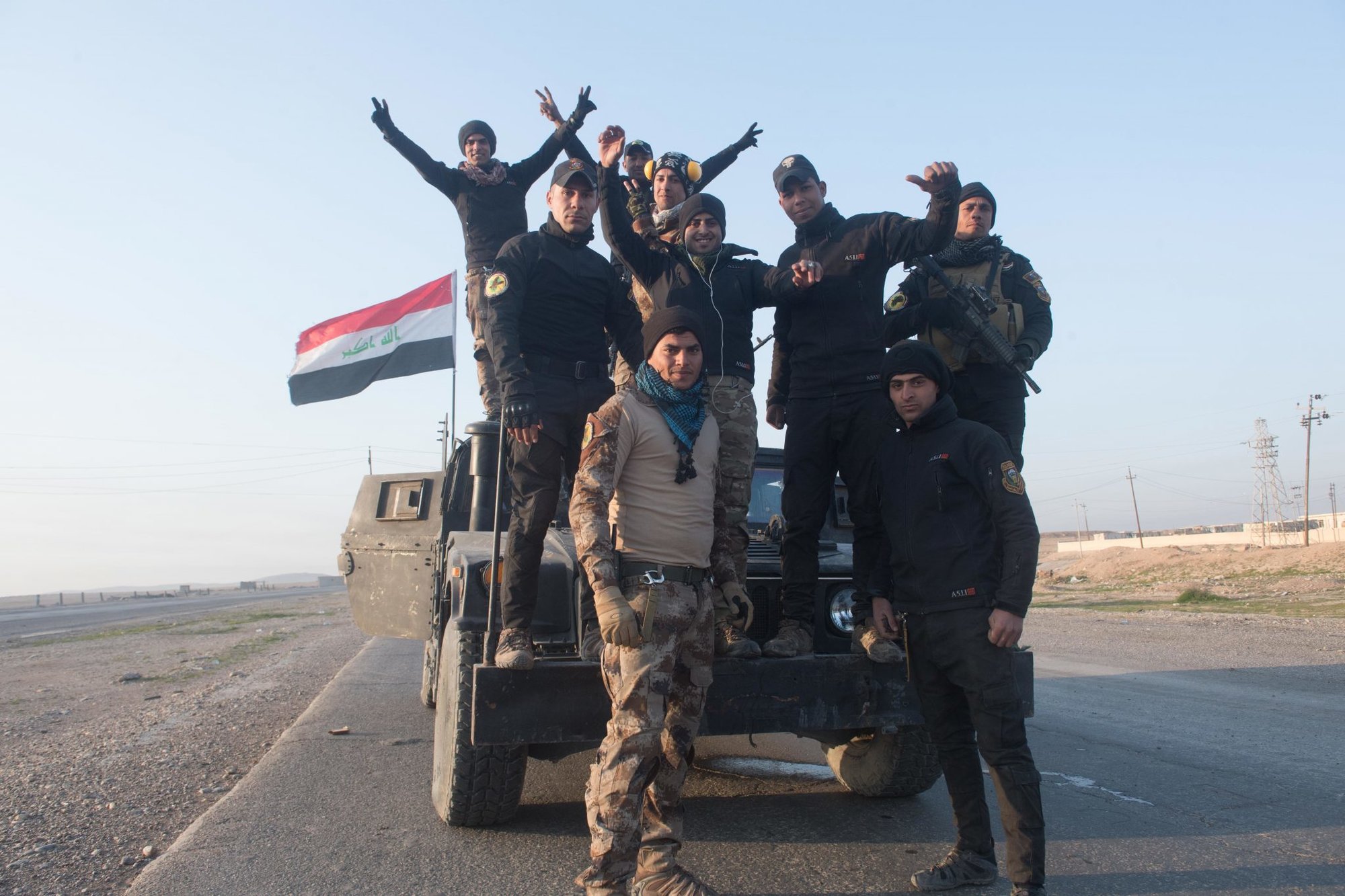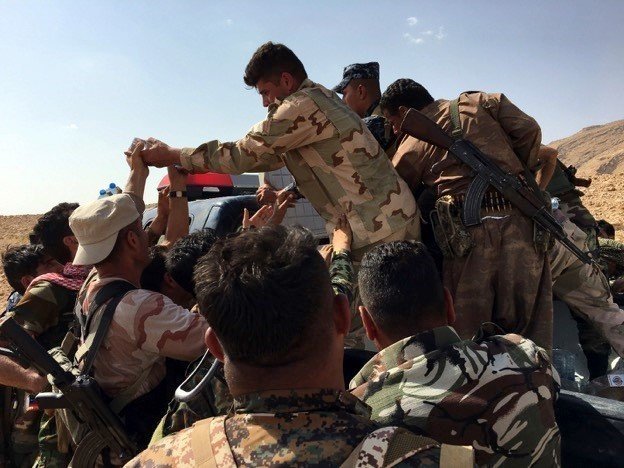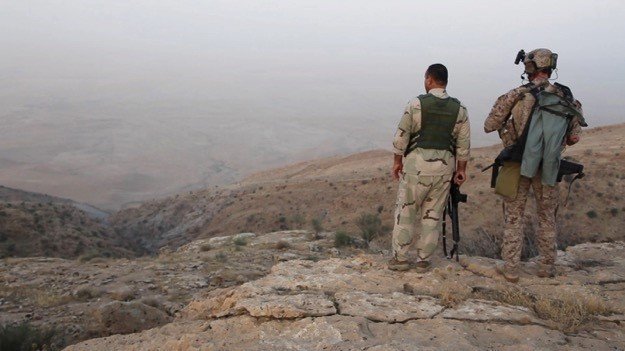While ISIS Fights on from the Shadows, Iraq Celebrates ‘Victory Day’

Iraqi Counter Terrorism Service soldiers wait for their convoy to move towards Mosul, Iraq, Feb. 23, 2017. The breadth and diversity of partners supporting the Coalition demonstrate the global and unified nature of the endeavor to defeat ISIS in Iraq and Syria. Combined Joint Task Force – Operation Inherent Resolve is the global Coalition to defeat ISIS in Iraq and Syria. U.S. Army photo by Staff Sgt. Alex Manne.
Iraq celebrated its third “Victory Day” on Thursday, commemorating the December 2017 territorial defeat of ISIS at the combined hands of the Iraqi military and Kurdish peshmerga forces, supported from the air by a US-led coalition of some 77 countries.
While ISIS has lost its territorial “caliphate” and now largely operates from the shadows, ensconced within the remote mountains and deserts of Iraq and Syria, the terrorist army also maintains sleeper cells within urban areas across Iraq. On Tuesday, for example, Iraqi special operations teams conducted a series of raids on ISIS strongholds in the country’s Salah ad Din and Anbar provinces. US military officials said the Iraqi commandos arrested six ISIS suspects.
Operation Inherent Resolve, the international coalition formed to prosecute an air war against ISIS in 2014, still regularly supports Iraqi troops with airstrikes and airborne intelligence, surveillance, and reconnaissance as they continue to prosecute raids on ISIS holdouts.
“On this day of celebration and remembrance, I want to thank the people of Iraq for your courage and your continued friendship,” US Army Lt. Gen. Paul Calvert, commander of Operation Inherent Resolve’s Combined Joint Task Force, said in a video message posted to the task force’s Twitter account on Thursday.
“Just a few years ago, Daesh attacked your families, devastated your cities, and sought to destroy your nation,” Calvert continued. “The people of Iraq rose up. And our global coalition of 77 nations rallied behind you to defeat Daesh. The Iraqi military continues to protect the people of Iraq through their service, commitment, and sacrifice. Our coalition joins you in celebrating the strength of Iraq and your lasting victory against Daesh.”
Today marks the 3rd anniversary of Victory Day in Iraq. CJTF-OIR pays tribute to the resilience demonstrated by the Iraqis & the bravery & sacrifices of the ISF and the Peshmerga in the fight against Daesh. We stand in solidarity with all Iraqis for a peaceful & prosperous Iraq. pic.twitter.com/3JZ2BU9RIG
— Inherent Resolve (@CJTFOIR) December 10, 2020
Since 2014, Operation Inherent Resolve has helped liberate 42,471 square miles of territory, and some 7.7 million people, from ISIS occupation. Today, the coalition says it remains “committed to the enduring defeat of Daesh.”
That enduring defeat requires a continued, if significantly scaled-down, war effort — including the intermittent use of American air power to bomb ISIS strongholds. In September, the last available month of strike data, the Operation Inherent Resolve coalition conducted seven airstrikes in Iraq, killing 18 ISIS militants.
The US declared victory over ISIS — the terrorist army alternatively known by the pejorative Arabic name, Daesh — in March 2019, after the Kurdish-led Syrian Democratic Forces overran the terrorist group’s final stronghold in the Syrian village of Baghuz. Since that time, however, ISIS has steadily expanded its footprint in other regions, such as Afghanistan and West Africa.
Nonetheless, the Department of Defense plans to withdraw thousands of US troops from Afghanistan and Iraq by mid-January. According to the Pentagon, the US military presence in Iraq is set to diminish by some 500 troops, leaving 2,500 military personnel in the country.
For their part, US military officials in Iraq say the reduced troop levels will not affect America’s enduring support for Iraqi forces as they root out the remnants of ISIS. US Army Col. Wayne Marotto, a spokesman for Operation Inherent Resolve, said the reduction of US manpower in Iraq would have a “limited” impact on operations to defeat ISIS.

“We will continue to work with our partners to protect our gains against ISIS and deter any future aggression,” Marotto said Nov. 30 on Twitter.
Following the 2003 US invasion, ISIS began as a hyperviolent offshoot of al Qaeda in Iraq. Ayman al-Zawahiri, who took over leadership of al Qaeda after the 2011 death of Usama bin Laden, reportedly disavowed ISIS as early as 2007 due to the group’s excessive brutality.
Under the leadership of Abu Bakr al-Baghdadi, and drawing from the ranks of many former Iraqi Ba’ath party members (the party of the deposed Iraqi leader, Saddam Hussein), ISIS grew into a formidable military force, which drew recruits from around the world into its ranks. Notably, the terrorist group’s leaders harbored aspirations for statehood, rather than simply prosecuting nihilistic violence.
With some 10,000 militants in its ranks, ISIS blitzed across Syria and northern Iraq in 2014, creating a territorial caliphate the likes of which al Qaeda, the terrorist group responsible for the Sept. 11, 2001, attacks, was never able to accomplish. ISIS’ 2014 offensive, which caught US officials off guard, seized control of about one-third of Iraq’s territory, including its second-largest city — Mosul.
In 2014, ISIS invaded the Yazidi enclave of Sinjar in northern Iraq — home to about 88,000 people. Once in control, the Islamist militants summarily killed thousands of Yazidis and kidnapped 7,000 women as sex slaves.
Seeking refuge from the onslaught, tens of thousands Yazidis fled to nearby Sinjar Mountain; many died there from exposure while waiting for help. The Yazidis’ plight on Sinjar Mountain was what ultimately spurred the US to launch the coalition bombing campaign against ISIS.
Kurdish and Yazidi forces freed Sinjar in November 2015. A coalition of Kurdish and Iraqi forces liberated Mosul from ISIS occupation in July 2017. On Dec. 9, 2017, Haider al-Abadi, Iraq’s prime minister at the time, announced that all ISIS forces had been driven from the country’s territory. He declared Dec. 10 as a national holiday to commemorate the victory.

During its three-year reign of terror, ISIS killed tens of thousands of Iraqi civilians, and more than 3.2 million Iraqi civilians fled their homes due to the war.
“The violence suffered by civilians in Iraq remains staggering,” the United Nations reported in January 2016, at the height of fighting. “[ISIS] continues to commit systematic and widespread violence and abuses of international human rights law and humanitarian law. These acts may, in some instances, amount to war crimes, crimes against humanity, and possibly genocide.”
Three years after Iraq declared victory over ISIS, the terrorist group’s sleeper cells and sympathizers still harass religious minorities. Across Iraq, Christians and Yazidis continue to live on edge, wary about publicly demonstrating their faiths for fear of violent reprisals. And for those who sought refuge from ISIS by fleeing to Iraqi Kurdistan, many remain reluctant to return to places like Sinjar and Mosul for fear of ISIS’ persistent, shadowy presence.
“The Daesh mentality is still there, many well-known terrorists just blended back into the community,” Besman Naif, then 42, a Christian man originally from Mosul, told this correspondent during an earlier interview.
“There are still Daesh cells operating in the city,” Naif said of Mosul. “It’s very dangerous.”

BRCC and Bad Moon Print Press team up for an exclusive, limited-edition T-shirt design!
BRCC partners with Team Room Design for an exclusive T-shirt release!
Thirty Seconds Out has partnered with BRCC for an exclusive shirt design invoking the God of Winter.
Lucas O'Hara of Grizzly Forge has teamed up with BRCC for a badass, exclusive Shirt Club T-shirt design featuring his most popular knife and tiomahawk.
Coffee or Die sits down with one of the graphic designers behind Black Rifle Coffee's signature look and vibe.
Biden will award the Medal of Honor to a Vietnam War Army helicopter pilot who risked his life to save a reconnaissance team from almost certain death.
Ever wonder how much Jack Mandaville would f*ck sh*t up if he went back in time? The American Revolution didn't even see him coming.
A nearly 200-year-old West Point time capsule that at first appeared to yield little more than dust contains hidden treasure, the US Military Academy said.












